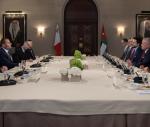You are here
Beyond the neocon debacle to peace in Ukraine
Oct 07,2023 - Last updated at Oct 07,2023
We are entering the end stage of the 30-year US neocon debacle in Ukraine. The neocon plan to surround Russia in the Black Sea region by NATO has failed. Decisions now by the US and Russia will matter enormously for peace, security and wellbeing for the entire world.
Four events have shattered the neocon hopes for NATO enlargement eastward, to Ukraine, Georgia and onward. The first is straightforward. Ukraine has been devastated on the battlefield, with tragic and appalling losses. Russia is winning the war of attrition, an outcome that was predictable from the start but which the neocons and mainstream media deny till today.
The second is the collapsing support in Europe for the US neocon strategy. Poland no longer speaks with Ukraine. Hungary has long opposed the neocons. Slovakia has elected an anti-neocon government. EU leaders (Macron, Meloni, Sanchez, Scholz, Sunak and others) have disapproval ratings far higher than approvals.
The third is the cut in US financial support for Ukraine. The Republican Party grassroots, several Republican presidential candidates and a growing number of Republican members of Congress, oppose more spending on Ukraine.
The fourth, and urgent from Ukraine’s point of view, is a likely Russian offensive. Ukraine’s casualties are in the hundreds of thousands, and Ukraine has burned through its artillery, air defences, tanks and others heavy weapons. Russia is likely to follow with a massive offensive.
Ukraine is at risk of economic, demographic and military collapse. What should the US government do to face this potential disaster?
Urgently, it should change course. Britain advises the US to escalate, as Britain is stuck with 19th century imperial reveries. US neocons are stuck with imperial bravado. Cooler heads urgently need to prevail.
President Joe Biden should inform President Vladimir Putin that the US will end NATO enlargement eastward if the US and Russia reach a new agreement on security arrangements. Biden should agree to negotiate a security arrangement of the kind, though not precise details, of President Putin’s proposals of December 17, 2021. Biden foolishly refused to negotiate with Putin in December 2021. It is time to negotiate now.
There are four keys to an agreement. First, as part of an agreement Biden should agree that NATO will not enlarge eastward, but not reverse the past NATO enlargement. NATO would not tolerate Russian encroachments in existing NATO states.
Second, the new agreement should cover nuclear weapons. The US unilateral withdrawal from the Anti-Ballistic Missile Treaty in 2002, placement of Aegis missiles in Poland and Romania, US unilateral withdrawal from the Intermediate Nuclear Force (INF) Agreement in 2019, and Russia’s suspension of the New Start Treaty in 2023, have gravely raised tensions.
Third, Russia and Ukraine would agree on new borders, with the overwhelmingly ethnic Russian Crimea and heavily ethnic Russian districts of eastern Ukraine remaining part of Russia. Border changes would be accompanied by security guarantees for Ukraine backed unanimously by the UN Security Council and states such as Germany, Turkey and India.
Fourth, the US, Russia and EU would re-establish trade, finance, cultural and tourist relations. It is certainly time once again to hear Rachmaninoff and Tchaikovsky in US and European concert halls.
If Russia, Ukraine, or the US subsequently violated the new agreement, they would be challenging the rest of the world. As JFK observed, “even the most hostile nations can be relied upon to accept and keep those treaty obligations, and only those treaty obligations, which are in their own interest”.
Neocons carry much blame for undermining Ukraine’s 1991 borders. Russia did not claim Crimea until after the US-backed overthrow of Ukraine’s president Viktor Yanukovych in 2014. Nor did Russia annex the Donbas after 2014, instead calling on Ukraine to honour the UN-backed Minsk II agreement promising autonomy to the Donbas. The neocons preferred to arm Ukraine to forcibly retake the Donbas rather than grant the Donbas autonomy.
The key to long-term peace in Europe is collective security as called for by the Organisation for Security and Co-operation in Europe (OSCE). According to OSCE agreements, OSCE member states “will not strengthen their security at the expense of the security of other States”.
D. Sachs is professor and director of the Centre for Sustainable Development at Columbia University and president of the UN Sustainable Development Solutions Network. www.jeffsachs.org












